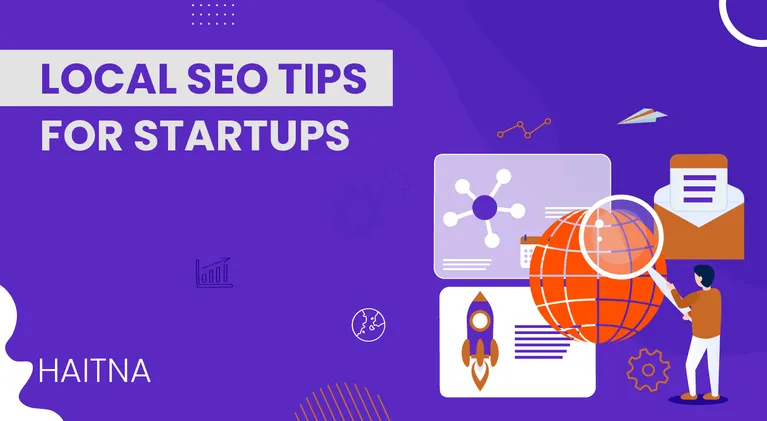
How to Optimize Your Startup for Local SEO
Local SEO for startups involves a lot of research. This includes keyword analysis, creating content for your local business, and optimizing your geographic location. We can help you optimize your website for the best possible Google ranking in local search results.
You need to consider several factors when ranking in local SEO. When it comes to startups, it's all about growth. You can find the right balance between growth and spending through our tips.
Let's take a look at a few SEO tips for startups.
15 Local SEO Tips for Startups
1. Identify Your Target Market By Analyzing Your Competitors
Local SEO is all about high visibility amongst a lot of competition. This can be especially difficult if you're in a challenging niche. One way to rank higher in your niche is to find out your competitor's keywords. This gives you a significant advantage in ranking for your niche.
Read: Competitor Analysis For Local SEO
If you are a small business owner, it must be challenging to compete against bigger entities. Initial competitor analysis can be a way you can level the playing field. It can be difficult to identify the keywords your competitor is using.
Regardless, this is a step in the right direction when you want to rank high on your searches. Several tools are available which can help you solve this problem.
- Spyfu can give you a lot of insights about competitor keywords.
- Ahrefs is the go-to when it comes to paid analytic tools.
- You can also try out WordStream's Free Keyword Tool for free options.
Here’s a screenshot of Spyfu showing competitor keywords:
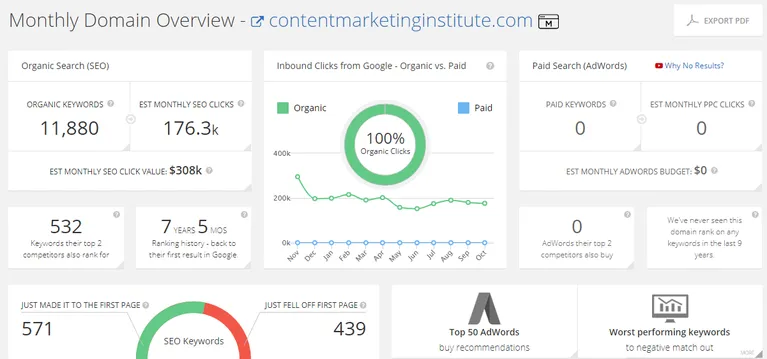
2. Create A Unique Value Proposition For Your Brand
The level of competition in local markets is growing. This makes it important for your brand to stand out. You can do this by creating a unique value proposition. This means you create a unique niche within your industry.
Making Your Own Unique Niche
As we've established before, local SEO is highly competitive. This means you're competing against other brands that offer the same services as you do. To stand out and appeal to your audience, you need to offer that extra.
Brands use technology to offer their audience a different perspective of their services. A good example of this is AR technology and virtual tours. These can get people much more engaged and excited about your services. It can even positively impact your SEO rankings.
- Several AR services around, like Shopify's AR service, can help.
- Google Virtual Tour is a module that can help your audience interact with your business.
- Wikitude provides geo-location-based AR experiences for customers.
This video by Shopify demonstrates Augmented Reality (AR).
3. Build Your Brand Reputation By Establishing Authority And Trust
Trust-based marketing has become an important part of businesses today. People are more interested in listening to what others think about a business. This has put the onus on trust as a valuable commodity for standing apart from your competitors.
Improving Trust Signals For Local SEO
Being an authority brand in a niche is all about doing and saying the right things. You need people to trust you to get better engagement for your brand. There are many ways businesses can build trust with their audience.
One method would be to create relevant and reliable content for your demographic. These content pieces need to be accurate regarding facts and statistics. Another factor is that you need to be regular with your posting.
- Google Trends can help you find what to write about in the current context.
- Ensure that your about page has all the required information about your business.
- Cite other high authority pages or websites from your niche.
Here’s a screenshot of Google Trends showing how popular a product is:
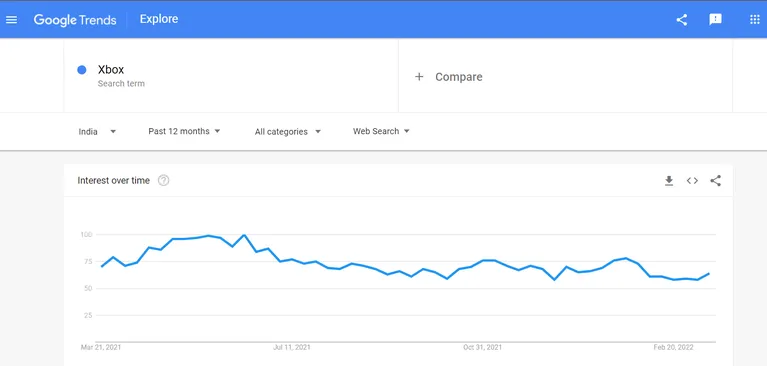
4. Optimize Relevant SEO Metadata
There are hundreds of thousands of startups going online every day on the internet. You need to ensure that you've got the basics right to make a difference. Local SEO is heavily dependent on how you optimize your metadata.
Streamlining Your Metadata
The local search optimization of any online business is based on optimizing relevant SEO metadata. The metadata includes information that you can easily share with people who benefit from it.
This is often overlooked and overlooked by most brands. This is despite being one of the most important aspects of local SEO. But to get the most out of your marketing process, metadata is a necessity.
- Most platforms like SEMrush can help validate your SEO meta tags and data.
- You might also need to get some A/B testing done with tools like RankScience.
- Use HubSpot's Website Grader for an overall website evaluation.
Here’s a screenshot of HubSpot’s Website Grader:
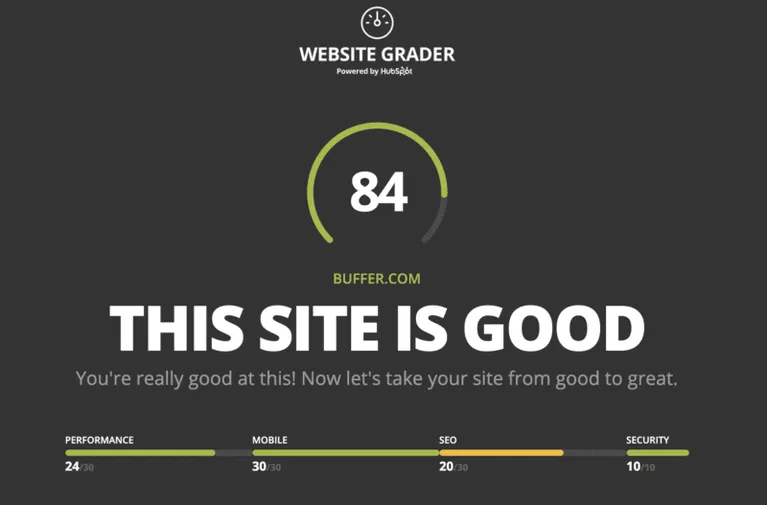
Read: Local SEO: On-Page Strategies for Success
5. Use Keywords That Are Most Relevant To Your Business
One of the easiest ways to get more traffic is to optimize your website for local keywords. When you use the right keywords, you improve your chances of being found by people. The chances increase when they search for products or services related to your business.
Read: Finding The Right Local Keywords
Before identifying the keywords, you need to understand the campaign's purpose. It could be to gain more visibility or improve engagement. And yes, the keywords you choose can affect different facets of SEO.
Another choice to make is between long-tail or broad match keywords. These can also impact your searches and give you different results based on your choice. Finding the right keyword can be a daunting task, but AI-assisted tools can help.
- Moz Keyword Explorer can deliver unique keyword profiles for your brand.
- AnswerThePublic is another keyword research tool that uses search relevance and volume.
- Keyword Tool.io also is a great choice for getting the right keyword for your business.
Here’s a screenshot of keywordtool.io displaying country-based keywords:

6. Claim And Optimize Your GMB Profile
Your Google My Business profile is critical for the local SEO framework. If you haven't already, the first thing you need to do is check the official page.
If there is already a listing in your brand's name, claim it. If not, add a new listing in your name and the required details.
Read: Optimizing Your GMB Profile
A GMB profile is the best way to leverage your business online with local SEO. Since it is from the Google ecosystem, you have a lot of connected services for your business. This includes Google Maps, Analytics, Email, and other features.
As useful as a GMB profile is, you need to make sure that you optimize it to get the most out of it. A good place to start is to ensure that all your NAP data is correct on the profile. Also, you need to verify your profile if you haven't done so already.
- Google has various tutorials on how to validate GMB profiles.
- Include keywords that are relevant to your niche for your GMB.
- Images and video help to make it more engaging.
Adding panoramic views of the business and the street boosts engagement:
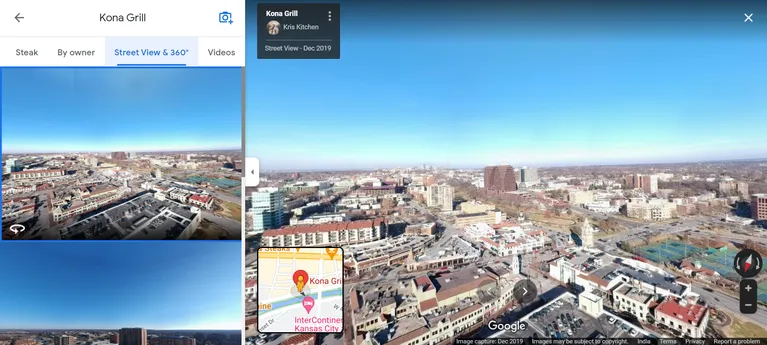
7. Leverage Social Media For Marketing Your Service
Social media has been a powerful platform for businesses to reach their audiences. Almost every business is on social media today. Social media has adapted to its new role as a business tool. It has several tools and add-ons that enable metrics and analysis on a granular level.
Read: Social Media Marketing Strategies For Local SEO
Most consumers who shop in local brick-and-mortar stores are looking to find a store near them when they search online. By having your business on these platforms, you provide consumers with a way to find you.
When done right, social media strategies can increase your brand reach. It maximizes your reach and gives you more chances to engage. You need to make sure that you have your business on multiple social platforms.
- Find the right social media influencers for your brand with Upfluence and Influencer.co.
- Buffer is a great tool for social media metrics and detailed analytics.
- Iconosquare can also help you track your social media account performance.
Here’s an example of the analytics Buffer shows:
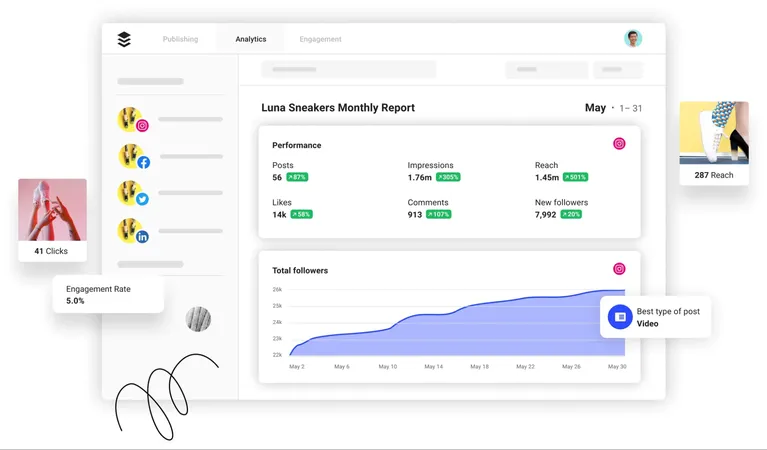
8. Track And Monitor your ROI
If you're using Google AdWords, it's important to consider the long-term value of what you are investing in. You must track and monitor your ROI to ensure that you are maximizing every dollar that you spend on paid searches. And this is especially true for startups.
Strategies To Analyze Your ROI
Your ROI is a great indicator of how well your marketing is progressing. It is useful when you have large investments in your marketing process. It helps you improve in areas that other metrics might not reflect.
ROI is a sensitive topic for startups specifically. The reason is that they have a much higher focus on getting the most out of their dollar. You can easily track ROI, and several tools can help.
- Popular platforms like Ahrefs and SEMrush have their ROI modules.
- Google Analytics also gives you a breakdown of your marketing spend.
- Many people also use Kissmetrics to analyze their budgets.
Here’s a screenshot of Kissmetrics showing how a business’s marketing budget is performing:
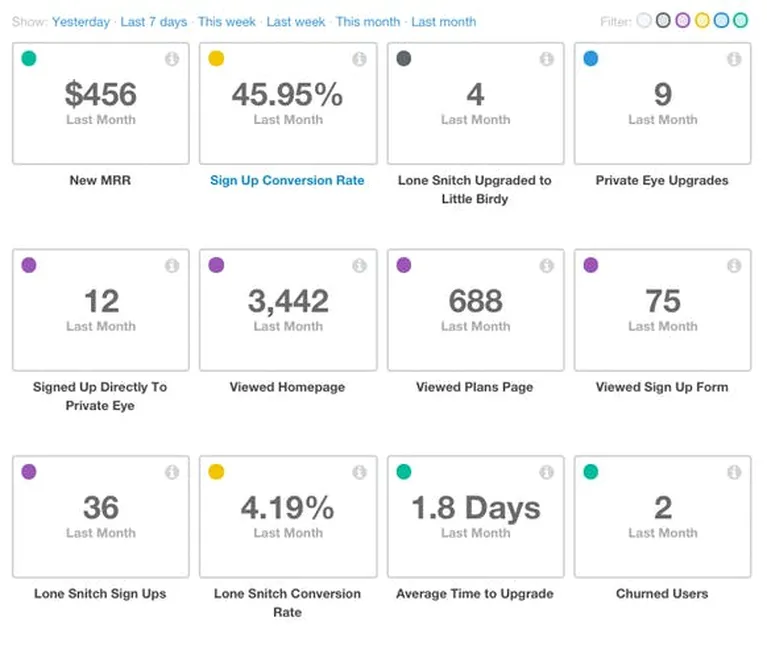
9. Build A Strong Backlink Profile
Local SEO is all about getting the right people to find you. When building your backlinks, it's all about building a strong profile. This means building links from relevant sites like industry-related blogs, directories, etc.
Backlinking And Local SEO
There are many ways to build a strong link profile. The most common method companies use blogging. This includes creating high-quality content for your website. Also, guest posting on other authority websites can help as well.
Content creation is just one method. There are other ways to gain backlinks, like posting on directories and forums. These can also improve your chances of linking to authority websites.
- Grammarly can help you audit your website copy and ensure error-free content.
- Linkody is an easy-to-use backlink tracker which can help you manage backlinks.
- You can use NinjaOutreach to contact other authority websites for guest posting.
Here’s a screenshot of Grammarly:

Read: Best Practices to Earn High-Authority Backlinks for Your Website
10. Attract Traffic From A Specific Area
If you are looking for traffic, you need to be aware of what is happening in your geographical area. While SEO is a global term, the reality is that you will need to target local searches for your business if you are looking to turn a profit.
Using Local SEO To Funnel Traffic
For a business focusing on a specific area, local SEO is a powerful method to get more website hits. National SEO can't help you because the constraints are too wide for that process.
Local SEO optimizes your website to focus on your city or region strongly. This enables increased traffic to your site from your local audience. You need locally relevant SEO meta that you can only get with local SEO.
- GrowthBar lets you focus exclusively on your local SEO factors.
- Yext monitors reviews and integrates with other SEO platforms as well.
- Whitespark is another exclusive local SEO platform.
Here’s a screenshot of Yext monitoring reviews:

11. Implement Reputation Management
Many startups are under the misconception that reputation management is only for bigger companies. But this is far from the truth. Reputation is a factor that affects all types of companies, including SMBs.
Using Reputation Management For More Business
While reputation management is often considered a form of marketing, it's also an important part of SEO. It increases trust in brands and improves their image for their audience. This is an invaluable service because customers rely increasingly on more trusted brands.
Local SEO is a major factor in building a good reputation among potential clients. The same applies to the online reputation management process. If you're a local startup, you need to do more than just monitor your local SEO rankings.
- Google Alerts is a great and simple way to check your reputation.
- SentiOne has real-time data about your online reputation.
- Reputology is the most used tool in this niche, and for a good reason.
Here’s a screenshot of creating an alert using Google Alerts:

12. Opt For Powerful SEO Tools
Sometimes, the difference can be the tools you use in a competitive market. As a startup, you need all the advantages you can get versus established competitors. While it might be a bit expensive, it will pay off in the long run.
The Right SEO Tools To Choose
With local SEO becoming complex and challenging, the need of the hour is tools. Today's local SEO tools are more powerful than ever. They can help you get the most out of your business. It can assess your marketing methods and provide you with the right solutions.
- Always check your budget when you're getting paid or subscription-based tools.
- You cannot ignore the Google Suite of tools. They offer great performance at a fantastic price point.
- Ahrefs and SEMrush feature on every local SEO tool list because they're good.
Here’s a screenshot of SEMrush performing a site audit:

13. Conduct Competitive Analysis
A great way to make sure you're not spending too much money on SEO is to conduct a competitive analysis. In other words, determine what your competitors are doing, and make sure you aren't doing anything that will make your website look like a clone of theirs.
How Competitor Analysis Can Improve Business
Competitive analysis refers to comparing your business with other similar businesses. This type of research allows you to determine what other businesses are doing and how they are doing it.
- SpyFu is one of the more popular business intelligence tools today.
- Searchmetrics lets you compare your local SEO metrics with your competitors.
- Another strategy is also to compare their content strategy with your website's.
Here’s a screenshot of Searchmetrics:

14. Optimize Your Website Copy And Blogs
How you write your copy and blog posts can be more important than designing your website. Google considers website copy and blog posts an integral part of the page's content.
Strategies To Create Powerful Content
It's important to make sure that these pieces of content are high quality. Ensure that the copy is clear and concise and conveys the right message. A well-written piece of content will always be more successful than a poorly written one.
- Use tools like Grammarly and ProWritingAid to eliminate quality issues.
- Find local keywords (Google Keyword Planner) and include them in the content.
- Promoting content is a tactic to get more shares and readers.
Here’s a screenshot of Google Keyword Planner:

Read: Step-By-Step Content Strategy For SEO
15. Remain Authentic To Your Brand Image
You need to establish your brand identity early on to become known as a trustworthy company. You should stay true to your original ideas, design, and values. That is what makes them you, and it would be ideal for sticking to that.
Don't Change The Essence Of Your Brand
Something that happens with several startups is that they try to become something they're not. It's a mistake to try to change yourself just because you've gained popularity or in case you didn't.
- Changing your brand voice can confuse people, and they will eventually not buy from you.
- It is important to let your personality filter to your brand website.
- Ensure that your content isn't generic or uninteresting.
Here’s an example of McDonald’s brand voice:

Local SEO for Startups - FAQs
1. What Is Local SEO, And Why Does My Business Need It?
Local search results are organic search results displayed on a map or grid showing where your business is located. These results are critical to people looking for businesses in specific locations. It helps potential customers to find you more easily.
2. Is Local SEO Difficult?
Local SEO is a challenging task today, and it requires specialized talent to execute. You should opt for an SEO agency rather than build your internal team like a startup. It is much more cost-effective in the long run.
3. Can I Do Local SEO On My Own?
You can, but if you want to get good results, you need more help with it. Local SEO is highly competitive, and having an experienced team can benefit your business.
4. Does Link Building Affect Local SEO?
Yes, link building done right can positively influence your local SEO strength. You need to be careful not to build too many links from your site. It is important as a startup to get the most out of your link-building pipeline.
5. What Tools Do I Need For Local SEO?
There are a lot of tools you require to improve your local SEO. Most better tools are paid, and some might be out of your budget if you're a startup. There are a lot of tools mentioned in this blog post. Checking them out could give you an idea about what you need.
Key Takeaways
- Spend a considerable amount of time on your keyword analysis phase.
- Performing well on local searches is all about having a strong SEO foundation.
- Leverage the use of geotags for your local SEO program.
- Analyze competitors for more insights on content and keyword strategy.
- Consider reputation and trust as critical parts of your local SEO process.
- Monitor your data related to ROI, keywords, and rankings for optimal performance.
- Overcoming challenges in local SEO is difficult without the right tools and strategies.
ABOUT THE AUTHOR:
Brice Decker

Brice has been handling marketing projects for more than 12 years and he is providing consulting services on SEO, Social Media and PPC. He has a huge expertise in working at large corporations including Accenture Interactive & PwC Digital Services.
Related Post
Local SEO for Multiple Locations
Local SEO for Appliance Repair Companies
Local SEO for Pest Control Firms
Local SEO for Nonprofit Organizations
Local SEO for Roofing Contractors
Local SEO for Auto Repair Shops
Local SEO for Landscaping Companies
Local SEO for Personal Trainers
Local SEO for Ecommerce Websites
Local SEO for Enterprise Firms
Local SEO for Asphalt Paving Contractors
Local SEO for Small Businesses
ABOUT THE AUTHOR:
Brice Decker

Brice has been handling marketing projects for more than 12 years and he is providing consulting services on SEO, Social Media and PPC. He has a huge expertise in working at large corporations including Accenture Interactive & PwC Digital Services.
Related Post
Local SEO for Multiple Locations
Local SEO for Appliance Repair Companies
Local SEO for Pest Control Firms
Local SEO for Nonprofit Organizations
Local SEO for Roofing Contractors
Local SEO for Auto Repair Shops
Local SEO for Landscaping Companies
Local SEO for Personal Trainers
Local SEO for Ecommerce Websites
Local SEO for Enterprise Firms
Local SEO for Asphalt Paving Contractors
Local SEO for Small Businesses